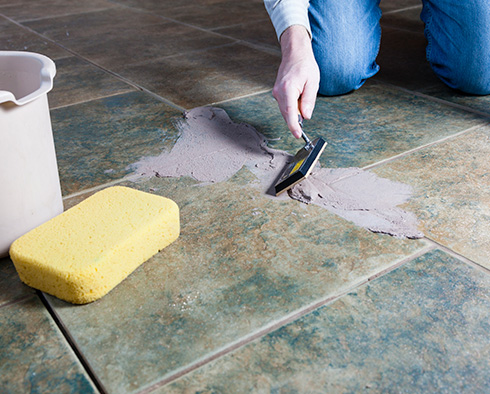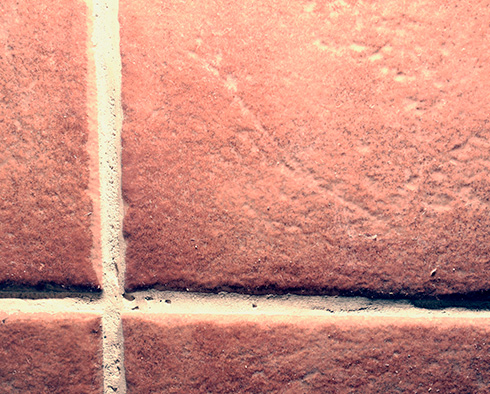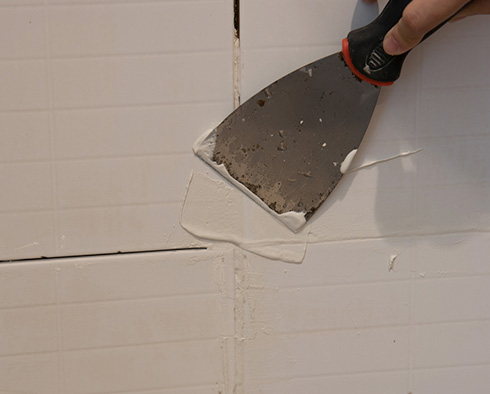Can I Use Bleach To Clean My Grout?
April 08, 2022
We use bleach for many things in our everyday lives, from whitening our clothes and disinfecting our pools to cleaning our bathrooms and toilets. It's used everywhere.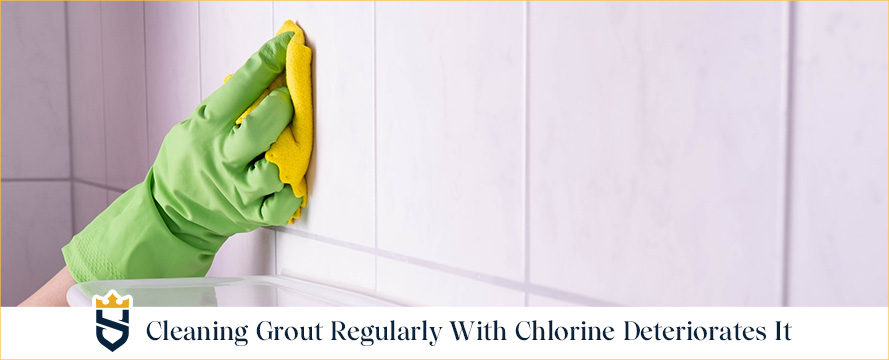
That's why many people assume it's a practical solution for all their disinfecting and cleaning needs. But when it comes to using it on your grout and hard surfaces, you should reconsider.
Chlorine won't deteriorate your grout immediately. However, using it as your everyday cleaner can result in gradual damage. In the beginning, it'll start to discolor your grout, and down the line, bleach may deteriorate it.
As stated in Healthline's article titled "Does Bleach Kill Mold and Should You Use It?" bleach is commonly used to kill mold and mildew on tiles and sinks. Unfortunately, it doesn't work nearly as well on porous surfaces like wood, drywall, and grout.
Unless you're ready to have your tile surfaces regrouted soon, it's best to avoid making bleach a regular part of your weekly cleaning routine.
But how do bleach and other conventional cleaning products harm grout? We'll explain the science as to why in the next section.
Why pH Levels of Cleaning Products Matter
Here's a quick lesson if you don't recall the pH scale from science class.It's a scale that measures the acidity or basicity of an aqueous (water) solution.
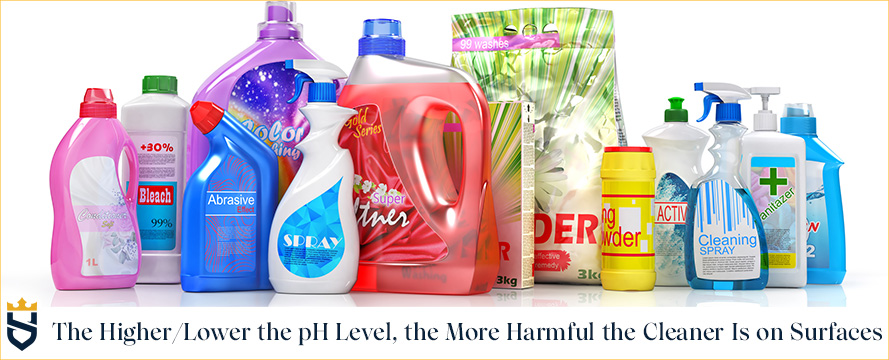
Solutions are acidic when a substance releases hydrogen ions (H+) in dissolved water, and there is a high concentration of H+. Solutions are basic (alkaline) when hydroxide ions (OH-) (oxygen and hydrogen) are dissolved in water, and they have a low H+ concentration.
Solutions that have an equal number of H+ and OH- are neutral.
But we're not trying to give a full science lecture here.
To keep it simple, let's focus on the range of numbers found on the pH scale and the cleaning products associated with those numeric values.
The scale ranges from 0 on the far left to 14 on the far right. From 0 to 6 is the range of acids, and 8 to 14 is the alkaline range. In the middle of the scale is the neutral pH value of 7.
Now, let's go over the average pH levels of common cleaning supplies found in stores.
Because the higher/lower the pH level, the more corrosive or harmful the cleaner is on surfaces that cannot withstand those levels of acidity or basicity.
In the end, you want a cleaner whose solution's pH level fits right in the middle.
How Bleach and Basic Cleaners Damage Grout
On the far right of the scale is chlorine bleach.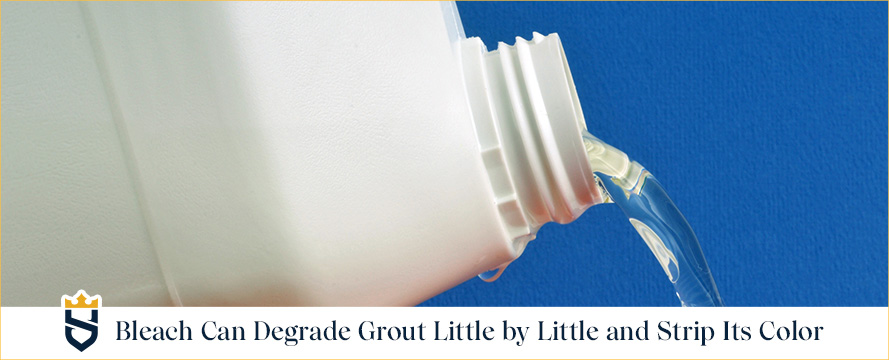
It's an alkaline solution that ranges from pH 11 to 13—sometimes 14 when highly concentrated.
Since chlorine is basic, it's caustic in nature. That means it can chemically eat its way through materials or corrode them.
For example, bleaching-dyed clothing discolors them, or for metals, it rusts them via oxidation-reduction reactions.
Bleach can degrade grout little by little and strip its color. Eventually, bleaching can dry grout, leading to cracks on its surface after repeated use over long stretches of time.
The same goes for ammonia-based cleaners. On the pH scale, its range is between 11 and 12, so it's almost as basic as bleach. And it has the same harmful properties on grout as bleach.
Acidic Cleaners Are Just as Damaging
On the left-hand side of the pH scale, you have your acidic cleaners.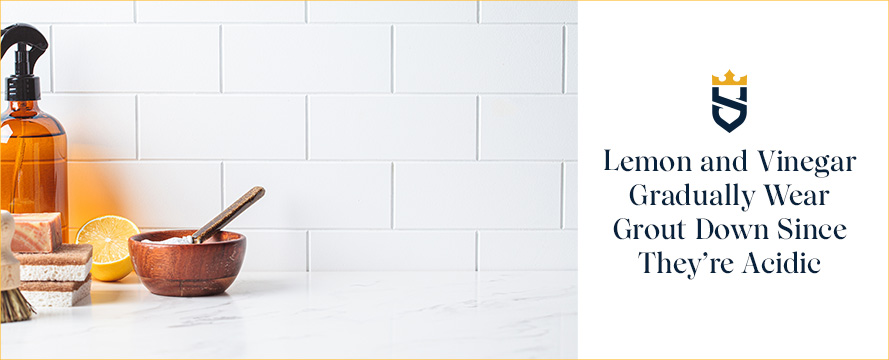
It's surprisingly common for people to use vinegar and lemon to avoid chemical cleaners. But they are just as harmful to grout.
Lemon and vinegar have an acidic pH level of 3 and will gradually erode the grout down or cause etch marks if it's unsealed.
Toilet cleaners are another example. They have a pH acidity level ranging from 1 to 3, and some can even reach battery acid levels of having a pH value of 0. Use extreme caution and avoid those at all costs on your grout.
In the end, bleach or alkaline solutions can damage grout as much as their acidic counterparts.
For Your Health, Avoid Using Harsh Chemicals
When it comes to harsh chemical cleaners, there's one thing both options have in common: they can potentially harm the people and animals around them while in use.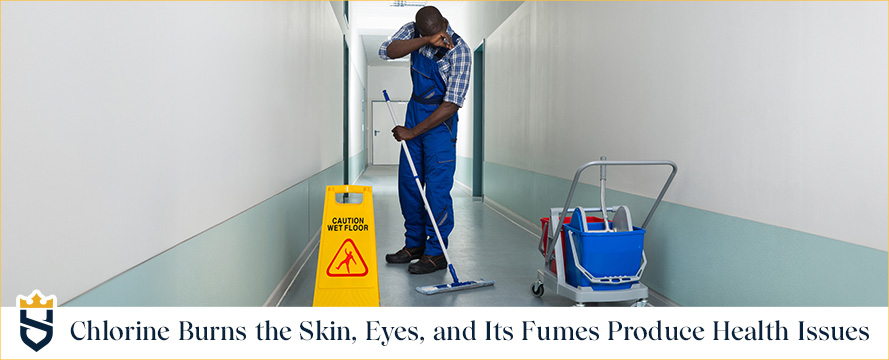
These cleaners release toxic fumes into the air, often causing dizziness and respiratory issues. Since they're corrosive, direct contact with these chemicals may result in skin burns and breathing issues for those who have asthma.
So, on top of being ineffective in cleaning grout long-term, bleach puts household members at risk. With that said, what's the best course of action for grout cleaning then?
Replacing Bleach – What's the Best Choice?
You should be using a cleaner that's as gentle as water. Neutral cleaners are your biggest asset for cleaning grout and your surfaces in general.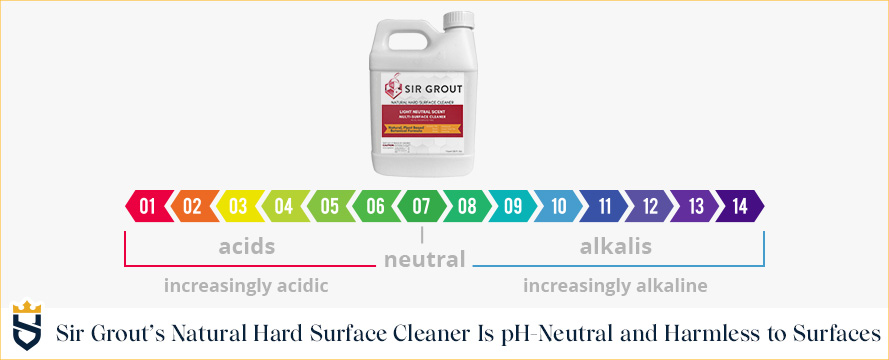
However, sealing your grout will always make things easier and more efficient—more on that later. Now that we know how bleach and acidic formulas can wreak havoc on hard surfaces, why are neutral cleaners the best option?
Neutral cleaners have a pH level of 7. If you wish, it's possible to use near-neutral cleaners that have a pH value of 6 or 8 on your grout.
Worrying about what happens to your surfaces or grout when you use harsh cleaners stops being a problem when you switch to surface-safe products.
Using a neutral cleaner means that there are no sticky film residues that trap the dirt within the pores of your grout. Lastly, it will remove all the stains without weakening the sealant if there's one in place.
We recommend using Sir Grout's Natural Hard Surface Cleaner. It's safe and works on ceramic and stone surfaces without degrading/etching them like ammonia, vinegar, or bleach-based products do.
Now, the advantages of neutral cleaners go beyond preserving the grout.
For one, there are no toxic fumes to worry about and no risks of burns if your skin comes in contact with it. You can feel safer while working closely with these products and use them as many times as you need to.
Properly Maintain Your Grout
If you have no other options but to use chemical cleaners, at least check the product's formula and the warnings on the label for safety.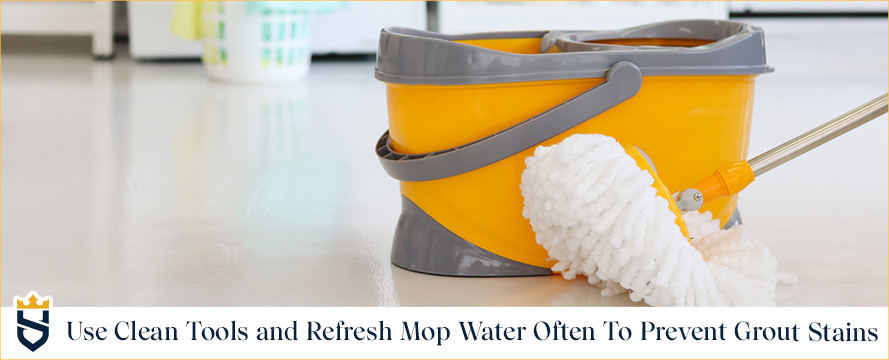
However, we highly advise you to use neutral cleaners on your grout and, from there, take steps to maintain your grout properly. The tools you use can affect the grout as much as your choice of cleaner.
With enough strength and elbow grease, steel wool and other abrasive brushes will scratch or damage the grout's surface when you try to scrub it clean.
Instead, use non-abrasive brushes. There are hard-strength nylon brushes you can use that come in all shapes, sizes, and angles that match the cleaning job you intend to work on.
Use a vacuum to remove debris from your floors before you start mopping. At a minimum, you can sweep them with a broom. Removing dirt helps prevent it from getting trapped within the pores of your grout, which makes it look stained.
Wash your floors with a fresh mop and wipe surfaces with clean towels or terry cloths. Make sure to change dirty mop water often and keep your cleaning equipment clean in between sessions.
Once done, properly ventilating your areas to dry is crucial in preventing mold and mildew growth. Avoid leaving damp spots after you've finished mopping your floors in all parts of your home, especially the bathroom.
On that note, cleaning spills as soon as they occur is another good way to prevent moisture buildup. Our blog "How To Clean Grout" expands on this more with many other useful cleaning tips that will help.
How Does Sealed Grout Help Cleaning?
When it comes to proper grout maintenance, we can safely say that choosing the right surface/grout cleaner is the perfect starting point. However, applying a long-lasting sealant is another major part of the process.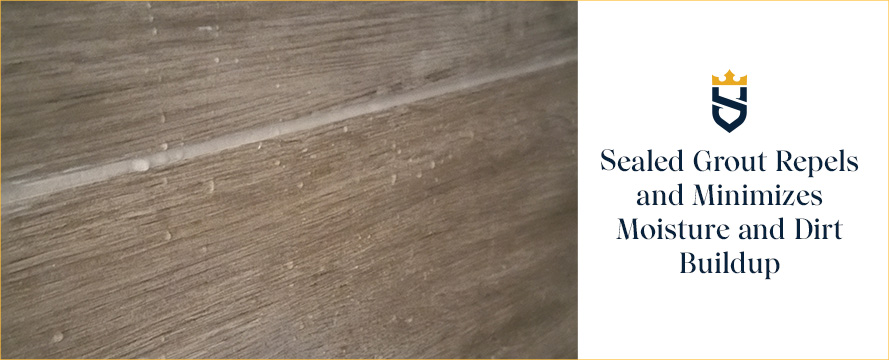
Because when your grout is unsealed, it's easier for water and other particles to seep into the grout's pores. Over time, your grout starts to look unkempt or starts to get moldy.
Moisture builds up on your shower's surfaces and affects the shower joints and corners in unsightly ways. The best solution to avoid tearing down your tiles is to get ahead of the problem and seal your grout.
Now, sealants are not a one-time fix.
They wear off from friction, harsh chemicals, and other factors. For example, they're bound to wear off faster in areas with heavy foot traffic, like hallways, entryways, etc.
So, how often should you have your grout sealed?
Grout should be sealed every two to three years at most. You can even check for yourself to know if they need replacing.
Try testing your grout's sealant with water. If beads of liquids don't flow off the grout after direct contact, darkening the grout instead, that's a sign it's wearing off.
By choosing your cleaning products correctly, you can increase the longevity of your grout's sealant. There's no denying that having your grout sealed will protect it from moisture, wear and tear, and many other outside elements.
Remember: Sealed grout makes your floors ten times more attractive, bringing out its color in ways that can sometimes transform a whole room.
Choose Sir Grout for Your Hard Surface Restoration Needs
Sealing your grout is simply the last step that completes the perfect cleaning routine when working with neutral cleaners versus bleach-based products.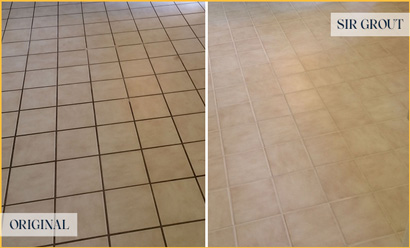
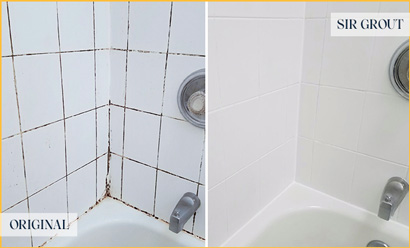
And if you need restoration services, Sir Grout is your premier choice.
We offer just what you need to help you recover your damaged grout while bringing out the beauty of your hard surfaces.
If your grout has been constantly subjected to chlorine or chemical-based products, our restoration services are the most effective way to restore life back into your tiles and grout.
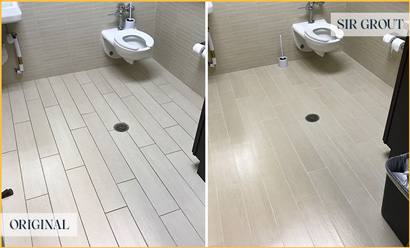
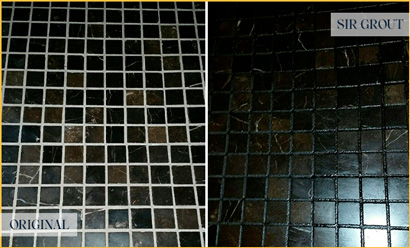
Sir Grout's sealing services are unmatched in both residential and business settings as our exclusive sealant proves to be a grout's best protection time and time again.
Once we've sealed your grout, it'll take no time to see the change in your cleaning routine, with your grout always looking its best.
You can always browse our website to see the results for yourself. If you need more information about any of our services, our specialists are always happy to assist you.
Whether you need stone cleaning and sealing, grout recoloring and sealing, caulking, stone countertop sealing, or high-durability coatings, Sir Grout is the ideal choice for guaranteed service you can trust.
We are the go-to experts when it comes to hard surface care and restoration.
Be sure to click on the "Schedule a Free Quote" button on this page or call us now for a free estimate at (866) 476-8863 if you have questions or need help with your home's grout.


